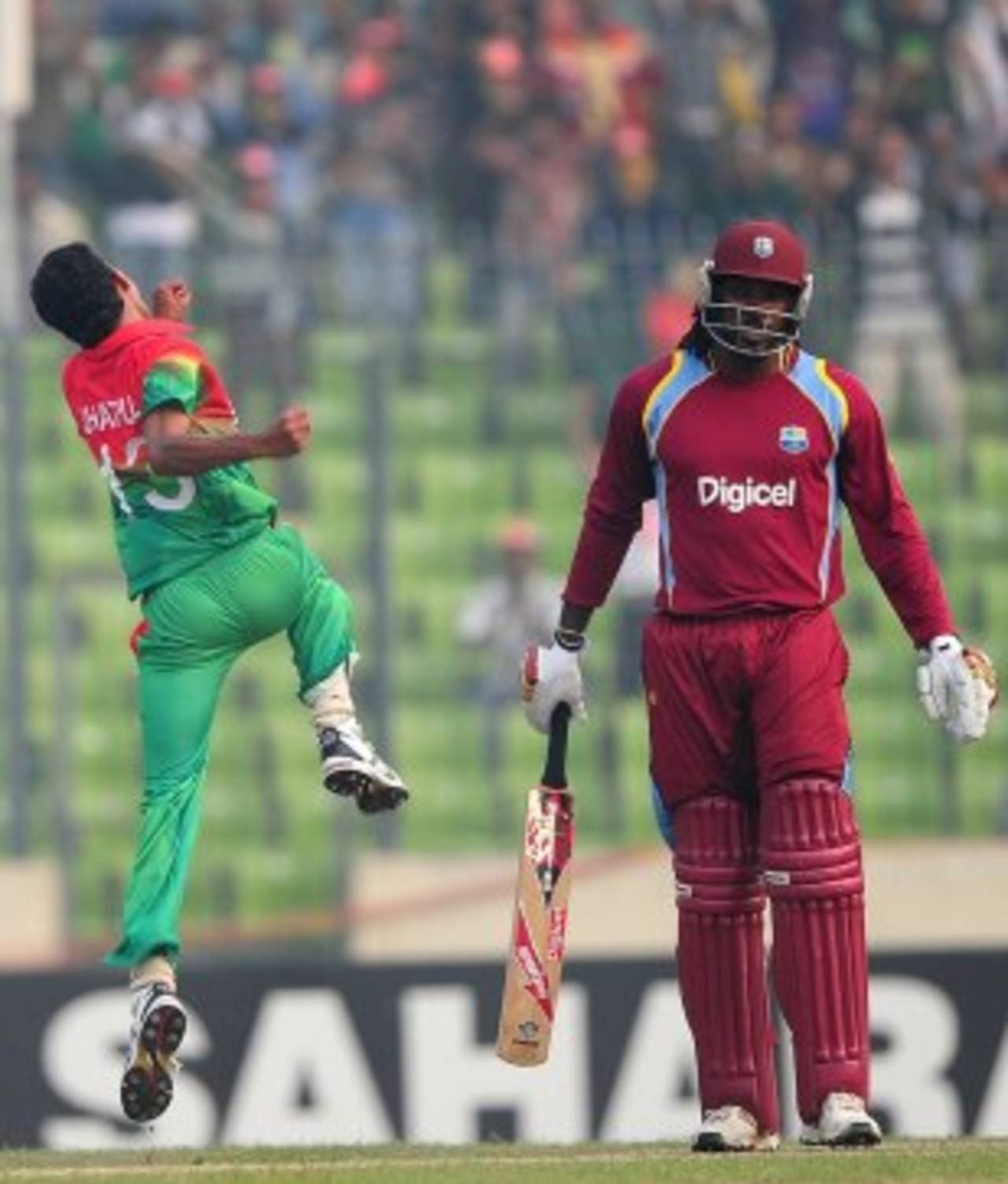Indisciplined West Indies must introspect
They must review why their bowlers conceded a shocking number of extras and their top-order batsmen batted so indifferently in the ODI series against Bangladesh
Garth Wattley
Dec 11, 2012, 5:31 AM

Chris Gayle has not scored a half-century in ten innings now • AFP
When Darren Sammy and his West Indies team got to Bangladesh, their objectives were clear: to win everything and leave as the No. 1-ranked T20 team in the world. They will leave with their mission not fully accomplished.
The 18-run win over the hosts in the sole T20 brought symmetry to a tour that West Indies began by sweeping the Test series. That T20 success also officially made Sammy's men the best on the planet in the shortest form of the game. But what transpired in between will have given their think-tank reasons for review and introspection.
Cricketing indiscipline was the bane of the team in the shorter games. A team will pay heavily if its bowlers are not on target, and so it proved in the 2-3 ODI series defeat.
With the exception of the first one-dayer, West Indies' bowlers conceded over 25 extras in every match. They also gave up four free hits, and most tellingly, gave away an unacceptable 55 wides in the five games; that's just about an extra ten overs the Bangladesh batsmen got to face.
Behind those untidy numbers was some erratic bowling. West Indies, as a group, strayed often in line and failed to keep to good lengths consistently, and this though they got five-wicket efforts in two matches, from Ravi Rampaul in the massive 160-run defeat in the second match, and from Kemar Roach in the two-wicket loss in the series decider; and four wickets from Sunil Narine in the victory in the third ODI.
Good one-day teams also are able to put up totals they can defend or chase successfully. But against Bangladesh, West Indies' batsmen did not do their work. Remarkably, only in one match - the fourth in Dhaka, largely due to Sammy's unbeaten 60 - did West Indies bat out their full quota of overs. That is a sin in limited-overs play, especially when batting first as they did in three of the five games. In those matches, they left a total of 31 balls unused.
Those figures reflected a great deal of impatience - all of the batsmen at various times playing the wrong attacking shots to the wrong balls, sometimes at the wrong times. The erratic nature of the play is emphasised by the fact that although Marlon Samuels got 126 in the third match, when West Indies got back into the ODI series, there were only two other 50-plus scores in the five matches - from Kieron Pollard (85) and Darren Bravo (51), both in the deciding match, and still West Indies could not muster more than 217.
You can't win many games playing like that. And so it proved. The question for the West Indies camp would be: why so much indifferent play?
In his defence of Chris Gayle at the end of the ODI series, Sammy made the point that cricket is a team sport. "We've got to pull together as a team. It's not every day the same people will perform... We just need more performances from the team and that would make us more successful."
West Indies' low scores in the ODIs therefore cannot be laid just at the feet of their best limited-overs batsman. But the fact cannot be escaped that Gayle's repeated failures were a factor in how the series went. Gayle once more experienced the levelling effect the game can have. Having been at the heart of much of West Indies' success in Tests, T20s and ODIs since his return to the side in May, he left Bangladesh without a fifty to his name in ten innings all told. In the one-dayers, his lack of impetus at the start of the innings was telling. The best opening stand he fashioned with his partners - Lendl Simmons (first two games) and Kieran Powell - was 48, with Simmons in the first match. And always Gayle was among the first three batsmen to be dismissed. It meant the team regularly lacked someone to give the innings momentum early and hold it together. Samuels, in the third ODI and in the T20, did so magnificently, but Bravo does not seem to have fully come to grips with batting in the limited-overs format yet.
Only Gayle can explain what went wrong for him in Bangladesh. But from a distance it did not seem as if he approached his innings with the same measured approach, the same focus, that had distinguished his previous play this year. West Indies, as a whole, did not play cohesively, not like they had been doing since their series against New Zealand. And an improving Bangladesh limited-overs unit punished them.
Gayle's miserly bowling in the T20, which helped to subdue the Bangladesh chase, was at least a positive way for him to end a low-key tour. But he and his mates will know they have to go back to the drawing board and work on their basics.
Garth Wattley is a writer with the Trinidad Express